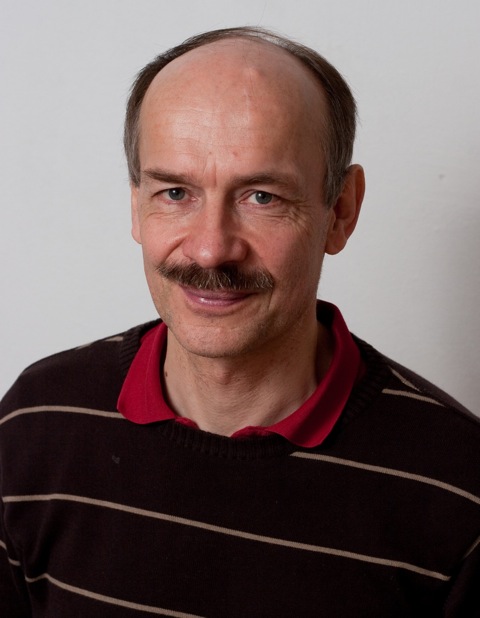Wolfgang Doppler, MD., Ph.D., Retired
Tel.: +43-512-9003-70150
Fax.: +43-512-9003-73130
E-mail: wolfgang.doppler@i-med.ac.at
Short CV:
*1953 in Graz, married, three children
1972 - 1982 studies in chemistry, University of Innsbruck
1979 - 1984 studies in medicine, University of Innsbruck
1977 Mag. rer.nat. (Physical Chemistry)
1982 Dr. phil. (Biochemistry)
1984 Dr. med.
1984 - 1987 Assistant Professor at the Institute of Medical Chemistry and Biochemistry
1987 - 1988 Scientific Member at the Ludwig Inst. f. Cancer Research, Berne, Switzerland
1988 - 1989 Research Fellow at the Friedrich Miescher Institute in Basel, Switzerland
1989 Habilitation in Biochemistry
1990 Associate Professor at the Institute of Medical Chemistry and Biochemie
Since 2005 Member of the Division Medical Biochemistry at the Biocenter
Since 2005 Co-ordinator of the Ph.D. progam "Molecular Oncology"
Teaching
Co-ordinator of Ph.D. study program "Molecular Oncology"
Modul Co-ordinator "Propädeutikum Medizinische Wissenschaften" (M.D. studies)
Courses and Lectures in Biochemistry for graduate and undergraduate students
Research:
STAT1 in cancer
Strengthening a productive anti-tumor immune response as well as suppressing tumor promoting activities of immune cells represent important therapeutic options in cancer treatment. For the rational design of appropriate strategies to achieve these goals, a more refined knowledge of the mechanisms regulating the recruitment, differentiation, expansion and function of tumor infiltrating immune cells is mandatory. In this context, we investigate the role of a key mediator of the action of interferons on cells of the innate and acquired immune system, the signal transducer and activator of transcription 1 (STAT1). It acts as a transcription factor to induce the expression of genes required for antigen processing, maturation and recruitment of immune effector cells, and of genes required for the antiviral defense. STAT1 also co-operates with the cellular machinery regulating proliferation and apoptosis.
In cancer, STAT1 has been shown to fulfill opposite roles in either promoting or impeding tumor development, depending on the stage of tumor development and the particular type of tumor: As a mediator of the interferon dependent anti-tumor immune response, STAT1 prevents or restricts the development of spontaneously formed tumors. However, particularly at later stages of tumor development, where the anti-tumor immune response is blunted by the tumor and immune cells are frequently subverted to facilitate the growth and survival of the tumor, STAT1 can contribute to tumor-promoting effects.
Ongoing research:
We are investigating the role of STAT1 in the infiltration, differentiation and biological function of tumor infiltrating immune cells. Our focus is on HER2 positive breast cancer. We are particularly interested on changes in the composition and function of tumor infiltrating immune cells upon treatment by chemotherapeutic agents, which act on the tumor epithelium but also influence the anti-tumor immune response.
Major achievements:
We could demonstrate anti-tumor as well as tumor promoting properties of STAT1 in spontaneously growing mammary tumors. They are promoted by two different subsets of immune cells, namely CD8+ T cells and tumor associated macrophages (TAMs). CD8+ T cells contribute to the anti-neoplastic activity of chemotherapeutic agents, i.e. doxorubicin and lapatinib, and this is critically dependent on STAT1. By this means, STAT1 serves in the anti-tumor response. STAT1 was also shown to be required for the regeneration of the B-cell compartment after doxorubicin induced bone-marrow toxicity by promoting the development of early B-cell precursors in the bone marrow. It is thereby important for the recovery of the B-cell lineage after treatment with this anti-cancer drug. On the other hand, STAT1 is positively influencing the infiltration of mammary tumors with TAMs by transcriptionally inducing the expression of the macrophage growth factor CSF1. We could show that intense local proliferation of fully differentiated macrophages rather then low-pace recruitment of blood-borne precursors drives the accumulation of TAMs, which themselves are promoting tumor growth. The tumor promoting effect of STAT1 via influencing differentiation and infiltration of TAMs was supported by the results of a retrospective study. There we could show an association of STAT1 mRNA levels with macrophage infiltration and bad prognosis in breast cancer.
Current research projects:
We are exploring the mechanisms by which STAT1 contributes to the chemotherapy induced anti-tumor immune response. In particular, we are investigating the role of the STAT1 target genes CXCL9, CXCL10 and CXCL11 in the recruitment and differentiation of CD8+ T cells.
Hypothetical mechanism for STAT1 dependent interactions between tumor and infiltrating cells in the response to chemotherapy:





